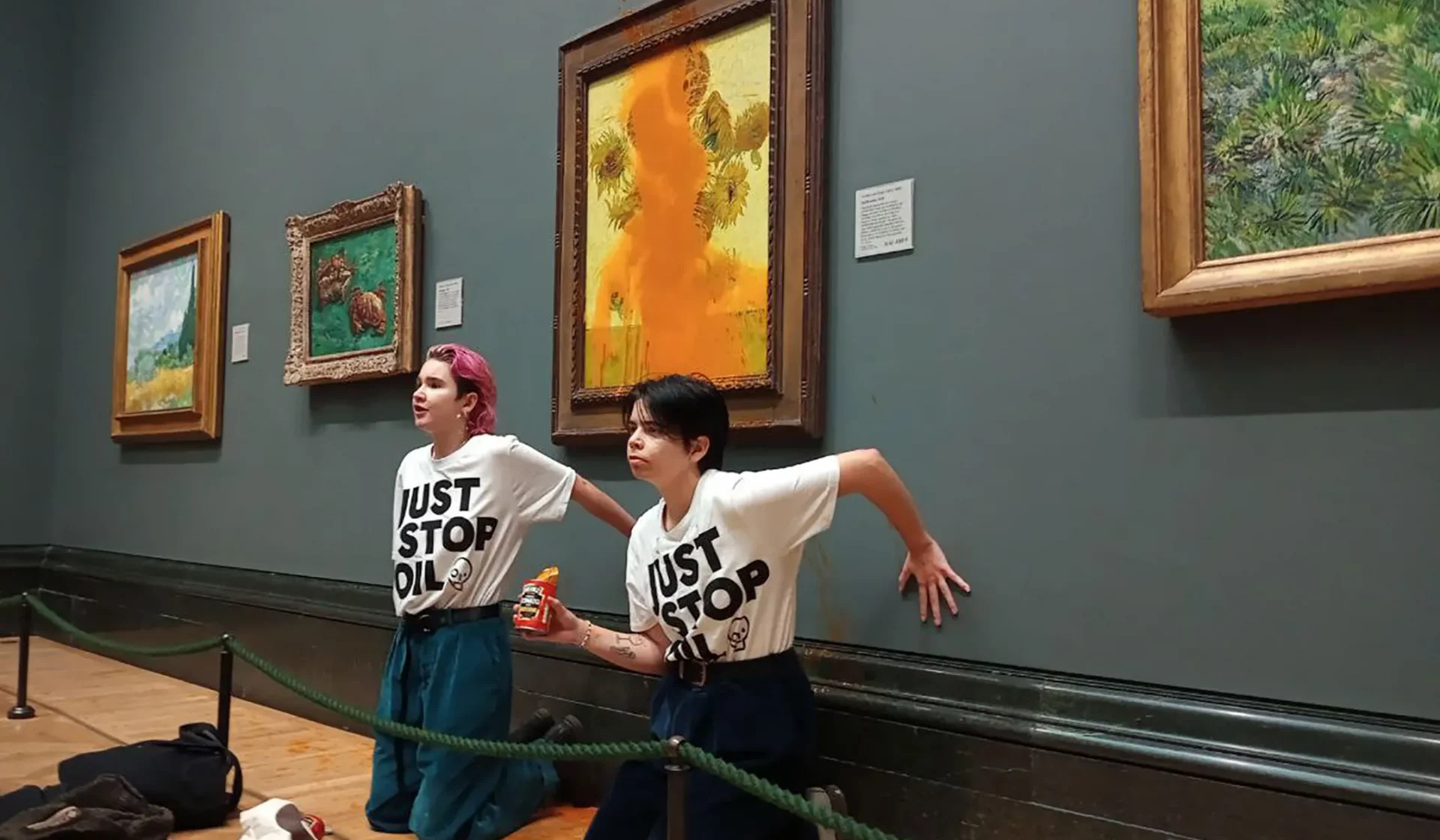A week ago, Just Stop Oil made headlines after two of its members threw soup over a Van Gogh painting. Ever since, the internet has been divided over the activists’ radical means of drawing attention to the climate crisis, some calling it ‘alienating,’ others ‘justified.’
Last Friday, controversy sparked when two young activists threw tomato soup over Van Gogh’s Sunflowers at the National Gallery in London.
‘What is worth more, art, or life?’, they asked, as security scrambled to detach them from the wall they’d glued themselves to. They were later arrested for criminal damage and aggravated trespass.
Members of the Just Stop Oil protest group, 21-year-old Phoebe Plummer’s and 20-year-old Anna Holland’s radical actions were part of a campaign to ensure that the UK government commits to ending all new licences and consents for fossil fuel production.
‘Is it worth more than food? Worth more than justice?’, they continued. ‘Are you more concerned about the protection of a painting, or the protection of our planet and people?’
In the week since, the answer to this question has been clear.
Although the painting is behind a pane of glass and was unharmed, politicians have flagrantly condemned what they call ‘attention-seeking vandalism’. Social media platforms have been flooded with outrage towards the attempted destruction of a cultural icon valued at $85 million.
The main critiques of the demonstration are that it was ‘overly performative’ and alienates those sympathetic to the cause by attacking a much-loved and significant piece of art.
Amid these claims, however, the Gen Zers’ bravery has not gone unnoticed by advocates across the globe who deem their radical means of raising public awareness about the severity of the climate crisis wholly justified. For them, the situation has effectively shone a light on society’s value systems.
More importantly, given how ignorant the world remains despite scientists’ repeated warnings that we’re hurtling towards planetary tipping points, they stress that tactics like these are simply a last-ditch attempt to safeguard our future.
That we no longer have any other choice following decades of failed efforts to galvanise those in power to bring about tangible change.
In this way, the protest symbolises a growing generational rift and the apathy of political and financial elites who hold the reins in making large-scale shifts across sectors to cut emissions.
So, with the internet divided over whether or not Just Stop Oil is right to have taken things to such a controversial level, we wanted to break it down even further and let you decide.
It’s a weird action to take: most people will see the headlines and not learn that the painting was shielded so wasn’t damaged. It’s not really raising awareness of their cause in any positive sense, most likely to make people disagree with it more, not less
— Dave Hemprich-Bennett (@hammerheadbat) October 14, 2022
The argument that radical activism loses people to the cause
‘Dear eco-warrior brats, your abominable act of vandalism on a magnificent painting only made me want to use more oil,’ wrote Piers Morgan for Sky News on October 20.
‘That’s my big problem with these clowns. Far from convincing the public to join their campaigns, they make most of us want to do the complete opposite.’
Now, as shocking as Morgan’s starkly negative commentary is, it echoes a sentiment that’s been frequently vocalised online by Just Stop Oil’s critics since Friday. That radical activism is counterproductive and only angers the very people it’s trying to appeal to.
Simply put, as has been shown by the visceral reaction on social media, non-radicalised people are now beginning to associate activism with sensationalism and theatre, instead of optimism and passion. In their opinion, protests should be directed towards the systems of power that cause injustice, rather than targeting something precious which offers a momentary escape from reality.
What on earth has Van Gogh's Sunflowers got to do with oil?
Why not shove Michelangelo's David into the sea to stop oil? Pound a mammoth skeleton into dust to stop oil? Stab a dolphin? Piss onto a puffin?
I'm completely behind stopping oil, but this seems mad. https://t.co/e625b5inUd
— Russ Jones (@RussInCheshire) October 14, 2022
Another argument is that merely getting publicity for a cause doesn’t automatically translate into generating support for it. This has been debated extensively, with many questioning the connection between a painting with no obvious environmental focus and the message portrayed.
‘The issue needs to be addressed in a way that doesn’t overshadow the point,’ muses Marsha Lederman for The Globe and Mail. ‘Has this led to meaningful conversation about the climate catastrophe? Or just a bunch of finger-pointing at these Gen-Z activists who are being painted as having no respect for fine art and the institutions that preserve it?’ In part, Lederman is right.





















